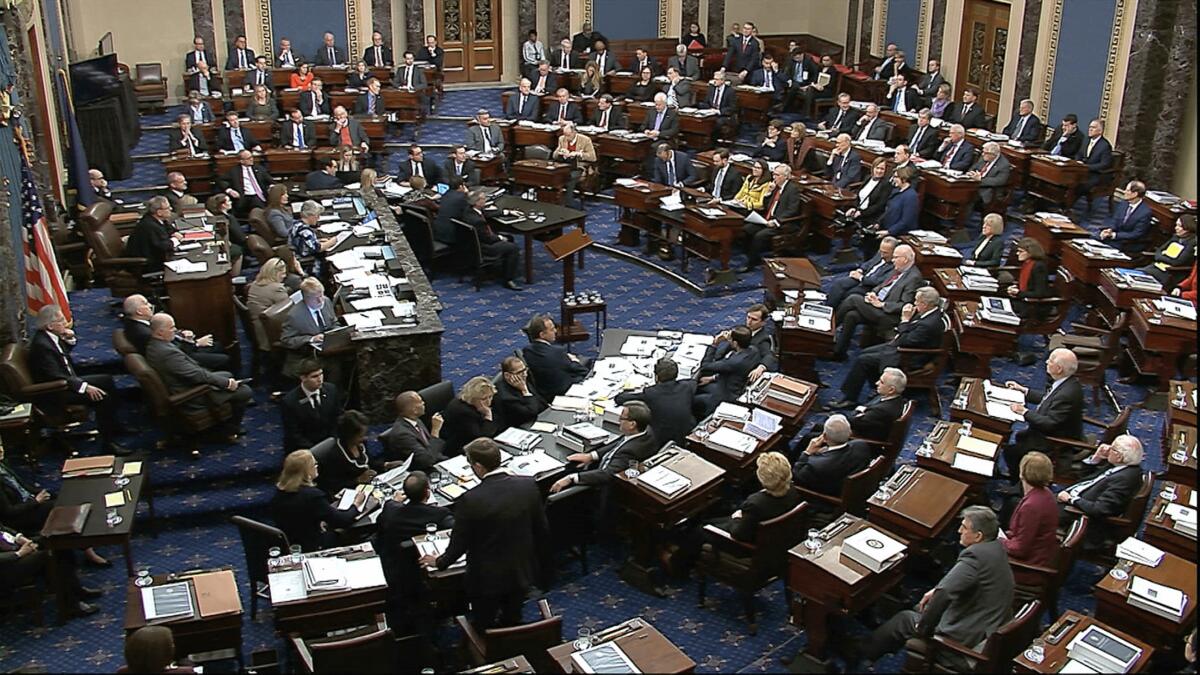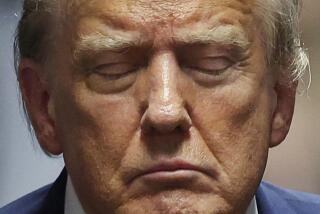No phones. No coffee. No talking. How senators are coping with long days of impeachment arguments

- Share via
WASHINGTON — No cellphones, no reading material, no talking. Not even coffee — just uncomfortable chairs to sit in, water or milk to drink and the monologues of the House impeachment managers and President Trump’s lawyers for eight or more hours per day.
These are the rules imposed on 100 senators as they proceed through what could be 10 or more long days of Senate jury duty. Lawmakers have been instructed by the Senate sergeant-at-arms to remain quiet “on pain of imprisonment” — or, at the very least, the scourge of political backlash.
While weighing the heavy constitutional matters of whether the president should be removed from office in the third presidential impeachment trial in American history, senators also have to contend with the fragility of the human condition: How much pretrial coffee is too much? How does a senator accustomed to hitting 10,000 steps each day sit still for eight-plus hours straight? How did people combat boredom before cellphones?
Their coping mechanisms have varied.
Many senators, such as Tammy Baldwin (D-Wis.), Kirsten Gillibrand (D-N.Y.) and Lamar Alexander (R-Tenn.), are frequently taking notes to stay focused. Sen. Patrick J. Leahy (D-Vt.) had written more than 50 pages of notes as of Wednesday afternoon.
Senators such as Mitt Romney (R-Utah), Michael Bennet (D-Colo.) and Patrick J. Toomey (R-Pa.) have taken to standing behind their chairs to stretch their backs. “It gets uncomfortable,” Toomey said.
Sen. Richard M. Burr (R-N.C.) handed out fidget spinners to his fellow Republicans at a closed-door lunch before the trial resumed Thursday. He flicked a green plastic spinner on his hand while Rep. Jerrold Nadler (D-N.Y.), one of the House impeachment managers, spoke about the conditions under which the Founding Fathers envisioned impeachment might be necessary.
Like Nadler, many politicians have been trying to channel the Founders’ intentions in recent months — citing Alexander Hamilton or James Madison, for instance. But Sen. Marco Rubio (R-Fla.) took it a step further: He brought an old-fashioned quill pen to the Senate floor, a gift to the sketch artists deployed by media companies to provide images from the chamber, where camera access is severely limited.
Sen. Marsha Blackburn (R-Tenn.) admitted she was on the floor reading “Resistance (At All Costs),” a book detailing opposition to the president. “Busy mamas are the best at multitasking,” she wrote on Twitter.
In a club where the average age is 63 — and more than a quarter of members are over 70 — some senators were lulled to slumber. Sen. Jim Risch (R-Idaho) was caught sleeping on Tuesday by a New York Times sketch artist who depicted the snooze. Sen. Bernie Sanders (I-Vt.) similarly examined the back of his eyelids on Wednesday.
Coffee and tea are out of the question. Senators can only drink water, sparkling water or milk while on the Senate floor, according to Senate practice (which for the stodgy old Senate may as well be written in stone). The limited beverages are served by Senate pages, high school students who study in Washington while working for the Senate. The full — and thirsty — Senate chamber meant those pages were furiously delivering drinks and the occasional note to senators this week.
Senators have largely stuck to water, but at least two — Burr and Sen. Tom Cotton (R-Ark.) — were spotted with a glass of milk this week.
The allowance for milk stems from the 1950s, when it was thought to be a good treatment for ulcers, according to Sen. Bill Cassidy (R-La.).
The ban on coffee doesn’t really faze him. The sludge in the Republican cloakroom is so bad “you’d wish it on a Democrat but no one else,” he said, quickly adding “just joking.”
Snacks and gum — while technically banned — have been heavily deployed. Sen. John Thune (R-S.D.) chewed gum with vigor in his first-row seat Thursday. In the back of the chamber, Sen. Chris Coons (D-Del.) shared his supply with neighbor Sen. Amy Klobuchar (D-Minn.). Sen. Kamala Harris (D-Calif.) has a stash of Reese’s in her desk.
But trial snacks don’t come without risks.
“If this thing goes on, we’re all going to gain like 10 pounds,” said Sen. Ron Johnson (R-Wis). “Another break? Gotta have another candy.”
While the candy ban has been broken, senators have largely adhered to the cellphone prohibition.
It has served as a form of detox for lawmakers accustomed to frequently checking email and Twitter.
“It has been liberating,” Leahy said. “I think it’s great not to have the computer.”
“It’s kind of refreshing,” Sen. John Kennedy (R-La.) said. He’s spending his time taking down questions he plans to ask the lawyers during 16 hours of question time expected next week.
He, like several other senators, have taken to slowly strolling around the back of the chamber. “I’m missing my workouts,” he said.
The wooden, cushioned chairs, senators say, are old, square and uncomfortable. As the hours wear on each day, those walks by Kennedy and others have become more frequent. And senators have taken longer breaks — going to the cloakroom for that cellphone check or a snack — but for the most part, they have remained in the chamber.
One exception so far was Sen. Dianne Feinstein (D-Calif.), who left the Capitol on Wednesday night an hour before the arguments ended because she was not feeling well , her spokesman said. She was back for the start of arguments Thursday but faced a backlash of Twitter outrage.
The Senate, an institution that tends to boast of its stodginess, never really entered the 21st century. Some of the desks are still the mid-19th century originals. Spittoons are stored underneath the desks of the top Republican and Democratic leaders (although there is no sign they’ve been used in decades).
Cellphones and other electronics have never been allowed on the Senate floor. Typically, that rule is flagrantly violated, but Majority Leader Mitch McConnell (R-Ky.) and Minority Leader Charles E. Schumer (D-N.Y.) have instituted a crackdown for the trial.
New cubbies — just like in school — were installed outside the chamber and in the cloakrooms to store iPhones — or a real apple, if you’re Sen. Cory Booker (D-N.J.).
And in another throwback to middle school, senators and staff passed occasional notes. Most contained thoughts and musings that will probably be lost to Senate history. But a few have been revealed.
When Sen. Susan Collins (R-Maine) heard Nadler on Tuesday night accuse the Senate of engaging in a “cover-up,” she fired off a note that made its way to Chief Justice John G. Roberts Jr., asking whether the comment conformed to Senate rules. Shortly afterward, he condemned lawyers representing both the House and the president.
As Wednesday’s arguments wore on, another piece of paper circulated urgently between a senior Republican staffer, a handful of senators and the president’s lawyers.
Finally, the note landed on the desk of the Senate’s presiding officer, in this case the chief justice, for a final ruling:
Is 6:30 p.m., the note asked in scrawling black Sharpie, the appropriate time to break for dinner?
Times staff writers Sarah D. Wire, Noah Bierman and Chris Megerian contributed to this report.
More to Read
Get the L.A. Times Politics newsletter
Deeply reported insights into legislation, politics and policy from Sacramento, Washington and beyond. In your inbox twice per week.
You may occasionally receive promotional content from the Los Angeles Times.











